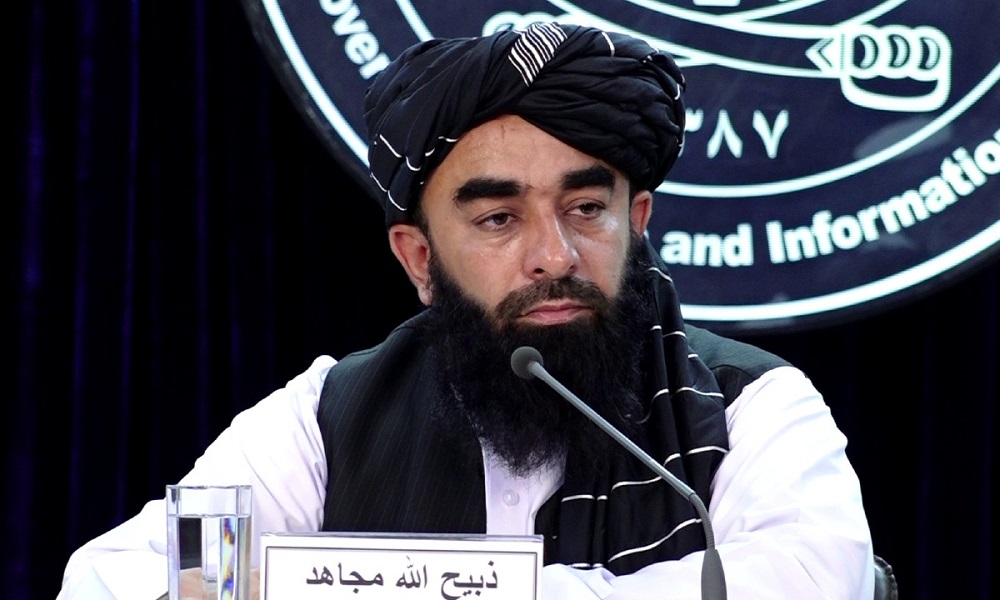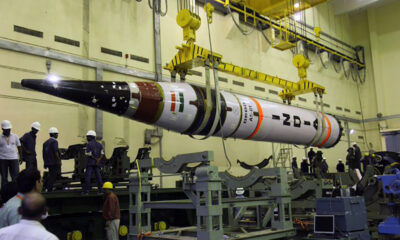Latest News
Bayat Foundation launches its winter aid program in Kabul

Bayat Foundation launched its winter aid program in Kabul, delivering food essentials to dozens of needy families in the western part of the city.
Foundation officials said they aim to provide aid to desperate families suffering from enormous hardships and hunger amid record low temperatures.
“This is part of Bayat Foundation’s winter aid [program] which is launched every year; fortunately this year we launched our aid [program] and are providing wheat flour, rice and cooking oil to needy people in west Kabul. The aid will soon reach other parts of Kabul and other provinces as well,” said Haji Mohammad Ismail, deputy head of Bayat Foundation.
Recipients thanked Bayat Foundation for the aid, and said they hope it will continue in the future. They also said they had been desperate for the supplies as they had no food in their homes.
“I would like to thank the Bayat Foundation for the aid. It will solve people’s problems. The people in west Kabul are very poor,” a recipient said.
“Bayat Foundation supports orphans and poor people. We hope it will continue to help them,” another recipient said.
The coordinator for helping distribute aid in west Kabul, Mohammad Hadi Hani said: “The aid is significant for the people in PD 13. I would like to thank the Bayat Foundation. I hope they will continue to help poor people here.”
Bayat Foundation delivers aid to needy people every winter. Officials say people in other provinces will also receive aid during this winter.
The aid comes at a critical time for Afghans who are not only dealing with widespread poverty but also with an exceptionally cold winter.
According to the latest figures from the UN Office for the Coordination of Humanitarian Affairs (OCHA), 28 million people in Afghanistan are affected by the ongoing humanitarian crisis.
Al Jazeera meanwhile reported that climate scientists have attributed the recent weather anomalies to polar vortex disruptions, as a result of which, strong arctic winds flow much farther from the North Pole and bring masses of cold air to our region.
According to Najibullah Sadid, an Afghan climate expert and associate researcher at the University of Stuttgart, prediction models estimated that the cold wave would last until the end of January or the first week of February, before the weather returns to average conditions.
“Afghanistan, like other countries, is witnessing a rise in the number of extreme events. This is much to do with climate change as more sun energy is observed by the Earth’s atmosphere that in turn increases the dynamic of atmospheric activities such as heatwaves, rapid rains, etc,” he said, adding that a lack of preparedness for such events could have disastrous consequences for Afghans, Al Jazeera reported.
Latest News
U.S. House approves bill on evacuation of Afghan allies

The U.S. House Of Representatives has passed a legislation on evacuation of Afghans who assisted Americans during the 20-year war in Afghanistan.
“The passage of the CARE Authorization Act of 2024 further underscores the commitment made by the U.S. government to safeguard those who served shoulder-to-shoulder with our personnel during the twenty-year mission in Afghanistan,” Congresswoman Dina Titus said in a statement.
“The State Department has made it clear: There is no deadline for the crucial job of protecting Afghan allies. By authorizing the Coordinator for Afghan Relocation Efforts at the State Department, we can more effectively relocate and resettle those who have qualified to immigrate to the U.S. as a result of their service to this country.”
In 2022 the State Department established a specialized office called the Coordinator for Afghan Relocation Efforts (CARE) to streamline and coordinate the ongoing relocation and resettlement process for eligible Afghans from Afghanistan and Pakistan to the United States.
The CARE Authorization Act of 2024 will formally authorize the CARE office at the State Department for three years and grant important authorities to advance its mission. These include an extension of authorities to enter into personal services contracts as well as measures to streamline the transfer of funds to and from other agencies involved in the Afghan relocation mission.
Latest News
Mujahid says IEA stands with media outlets

The Islamic Emirate’s spokesman Zabihullah Mujahid says the acting government is committed to supporting media outlets and they can operate within the framework of Islamic Sharia and national interests.
Marking World Television Day on Thursday, November 21, Mujahid said: “The Islamic Emirate of Afghanistan supports the media in general. Media can operate within the framework of Islamic Sharia and national interests.”
“As far as we are able, we cooperate with the media and the Afghan media currently have publications and they are broadcasting their publications well,” he added.
The United Nations General Assembly named November 21 as World Television Day in 1996.
“Since IEA’s takeover, of 184 national and local televisions, 57 television stations were shut down due to economic problems,” said Hojatullah Mujadadi, the head of Afghanistan Free Journalists' Association (AFJU).
Currently, about 370 visual, audio and print media are active in the country.
Latest News
Baradar says water crisis has negatively impacted relations between nations
Baradar expressed regret that although Afghanistan has vast water resources, effective and professional management has not been carried out in this area.

Deputy Prime Minister for Economic Affairs, Mullah Abdul Ghani Baradar, said on Thursday that the ongoing water crisis in the country has not only made neighboring countries face the problem of water scarcity, but it has also had a negative impact on political and economic relations between Afghanistan and these countries.
Speaking at a seminar held by the Ministry of Energy and Water, Baradar said that although water is a renewable natural resource, the shortage of water due to climate change, the increase in the level of water pollution, the growing demand of the people and its excessive consumption affects the country.
He expressed regret that although Afghanistan has vast water resources, effective and professional management has not been carried out in this area.
“It is now the responsibility of the Islamic Emirate of Afghanistan to fulfill its national duty for the optimal management of the country’s water resource,” Baradar said.
“With firm determination, we aim to use all available means to ensure sustainable development in water management.”
Last month, the United Nations Children's Fund (UNICEF) also warned that Afghanistan is experiencing a severe water crisis, and if no action is taken, Kabul’s underground water resources could be depleted by 2030.
In a message on X, UNICEF reported that Roza Otunbayeva, head of the United Nations Assistance Mission in Afghanistan (UNAMA), and Tajudeen Oyewale, head of UNICEF Afghanistan, visited a Kabul district to assess the city's water supply network.
Both officials expressed concern over the worsening water shortage problem in the capital.
"Water is life," UNICEF stated, emphasizing that rapid urbanization and climate change are accelerating the depletion of groundwater in Kabul.
“If we don't act now, we cannot stop this process."
The rapid population growth, unplanned construction of high-rise buildings, urban development without proper planning, and the excessive use of underground water resources are major factors contributing to the decline in both the quantity and quality of groundwater in Kabul.
Although Kabul has faced water shortages for years, the crisis has become more severe in recent times.
However, the Islamic Emirate is making concerted efforts to resolve the problem and thwart the crisis.
Three weeks ago, the office of the Deputy Prime Minister for Economic Affairs, said in a statement that plans to construct a total of 355 water reservoirs across the country were being implemented.
According to the statement, of the 355 dams, a number of them have already been completed and inaugurated while others are under construction.
Of these reservoirs, 138 are being constructed by the Ministry of Agriculture, Irrigation, and Livestock; 117 by the Ministry of Water and Energy; and 100 by the Ministry of Rural Rehabilitation and Development.
All of these dams are being funded by the Islamic Emirate of Afghanistan, the statement read.
The reservoirs are being constructed in numerous provinces to manage rainwater, prevent flooding, strengthen groundwater levels and for use by communities.
Iran’s water share
Late last year, Iranian Energy Minister Ali Akbar Mehrabian warned that if Afghanistan does not ensure Tehran receives its rightful amount of water from Helmand River, Iran will use legal and international means to resolve the problem.
Mehrabian stressed that Helmand River water is Iran's indisputable right, and that Iran takes the matter seriously.
“Water right is Iran's right and it is necessary to release it. Ensuring water rights is not optional, but it is mandatory based on the international treaty of 1351. Pursuing this matter is Iran's absolute right and we will not fail in this regard. The recent rains should cause the release of our water, and if not, we will take serious action based on international laws,” stressed Mehrabian.
At the time, the Islamic Emirate said it was committed to providing Iran with water from the Helmand River but due to drought, there is not enough water in the river to give Iran its share.
The Helmand River Water Treaty was signed between Afghanistan and Iran in 1973, according to which Iran has the right to receive 850 million cubic meters of water from Afghanistan annually.
-

 Sport5 days ago
Sport5 days agoFIFA unveils Innovative Club World Cup Trophy ahead of new tournament in 2025
-

 Regional5 days ago
Regional5 days agoIndia’s successful test of hypersonic missile puts it among elite group
-

 Latest News5 days ago
Latest News5 days agoTrump team compiling list of military officers responsible for US withdrawal from Afghanistan
-

 Latest News5 days ago
Latest News5 days agoCanada sent 19 failed asylum seekers back to Afghanistan last year
-

 Sport4 days ago
Sport4 days agoAbu Dhabi’s thrilling T10 tournament just days away
-

 World4 days ago
World4 days agoBiden allows Ukraine to use US arms to strike inside Russia
-

 Sport4 days ago
Sport4 days agoAfghanistan beat UAE by 169 runs in U19 tri-series
-

 Business5 days ago
Business5 days agoMullah Baradar inaugurates a blanket factory in Kabul
























